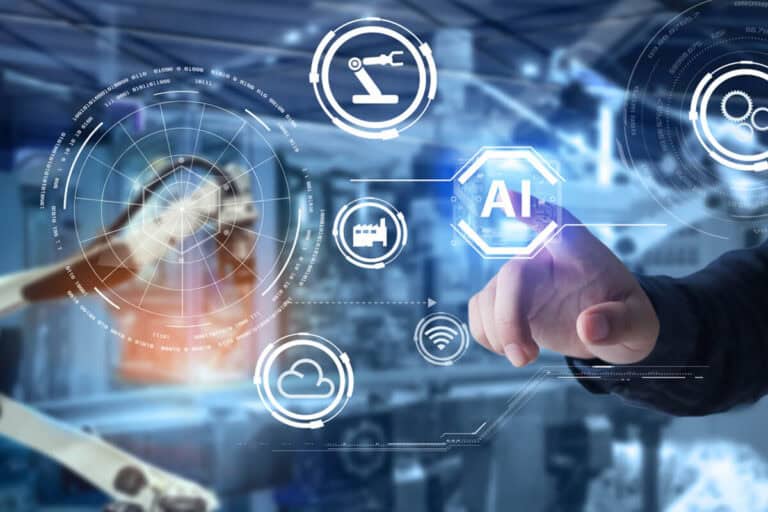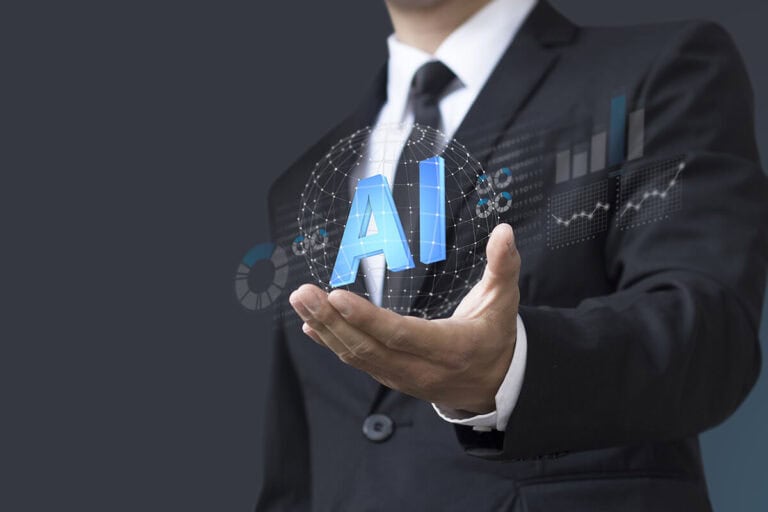Key Highlights
- The integration of artificial intelligence (AI) with enterprise resource planning (ERP) systems can enhance your company’s operational efficiency and competitive agility.
- AI technologies such as machine learning (ML), natural language processing (NLP), and robotic process automation (RPA) are enhancing user interactions, supply chain management, and other ERP-related functions.
- AI-enhanced ERP systems can streamline financial processes and automate human resource (HR) management tasks. Other “real-world” applications of AI in ERP include predictive maintenance and personalization of customer experiences.
- AI-powered predictive analytics and leverage of your historical ERP data can transform information into actionable insights for more accurate forecasting and better and faster strategic decision-making.
- Manufacturing and retail are two major markets in which companies are achieving demonstrable benefits from combinations of AI and ERP.
- Choosing the right AI-enabled ERP solution involves considering key features and vendor evaluation and selection criteria.
- Small businesses can also take advantage of AI-enhanced ERP systems. Benefits include cost savings, scalability, new and enhanced functionality, and competitive advantage.
Table of Contents
ToggleIntroduction
AI is transforming companies and revolutionizing industries by optimizing operations and driving better, faster, and more data-driven decisions. When combined with ERP systems, AI enhances efficiency and streamlines business processes in finance, operations, and HR management.
By automating tasks and leveraging AI technologies like machine learning (ML) and natural language processing (NLP), organizations can improve decision-making and extract valuable insights from data analysis. The fusion of AI and ERP offers advanced analytics, predictive capabilities, and enhanced decision-making for greater efficiency.
This article summarizes some of the technologies and business benefits spurring AI-ERP integration. The article also details some of those benefits and includes real-world examples of how AI innovations are enhancing ERP at companies in several industries. The piece wraps up by offering specific recommendations for selecting the right AI-enabled ERP solution and vendor for your business.
ERP Artificial Intelligence: the Fusion of ERP and AI
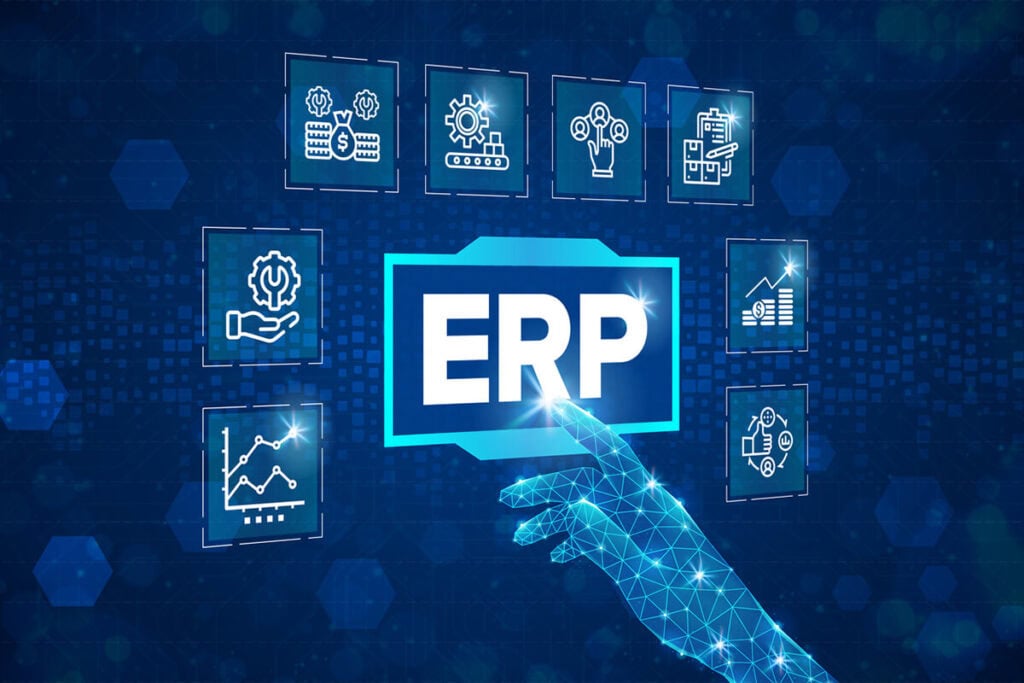
The confluence of AI and ERP technologies increasingly augment human skills, knowledge, and experience with conversational, “human-like” information systems and effective, pervasive automated processes. This integration enhances efficiency, streamlines operations, and enables data-driven decision-making. AI capabilities such as machine learning, natural language processing, robotic process automation, and predictive analytics optimize resource allocation and improve customer experiences. By leveraging AI within ERP systems, organizations can drive growth, increase productivity, and enhance competitive agility.
Core AI Technologies Enhancing ERP
Several specific AI technologies power new and improved ERP system features and abilities. Here are some of the most popular and important of those AI technologies.
Machine Learning (ML)
ML algorithms enable ERP systems to analyze vast amounts of data, identify patterns, and make predictions. This allows organizations to optimize resource allocation, improve decision-making, and enhance operational efficiency.
Natural Language Processing (NLP)

NLP enables ERP systems to understand, interpret, and interact with users in human language. Features such as speech recognition and generative AI support new forms of human input into enterprise applications. NLP can also improve online searches and power chatbots capable of handling incidents and escalating problems smoothly via voice input and response.
Robotic Process Automation (RPA)
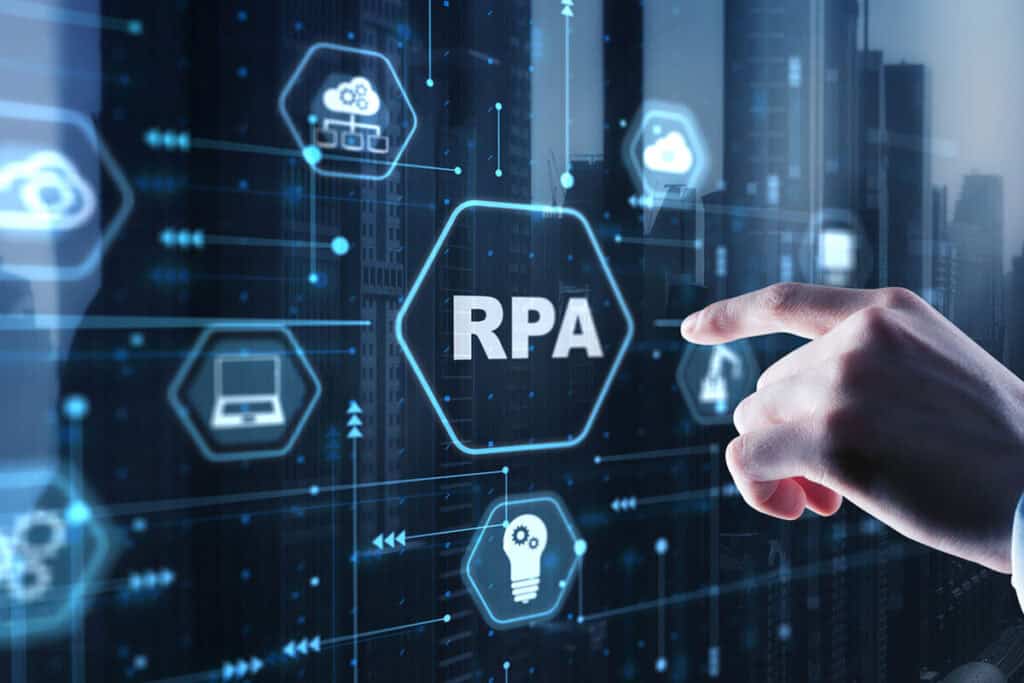
RPA automates repetitive tasks within ERP systems, freeing up human resources for more strategic initiatives. The technology can automate data entry, invoice processing, customer service requests, and other routine tasks. RPA also helps to ensure that processes consistently comply with business goals, needs, best practices, and regulatory requirements.
Predictive Analytics
Predictive analytics applies ML algorithms to high volumes of diverse historical data to identify patterns and trends and fuel insights and forecasts. Predictive analytics can enhance ERP system features for inventory management, demand forecasting, equipment maintenance, and strategic planning.
AI-Enabled ERP Streamlines Financial Processes
The integration of AI with ERP software systems can help your company to streamline operations and improve efficiency by automating tasks and fueling valuable insights. AI technologies can enhance invoice processing by automatically matching invoices with purchase orders and receipts, reducing errors and speeding up the cycle. AI can improve financial analysis by identifying patterns and trends, providing real-time insights, and enabling better decision-making. AI can leverage historical data and ML algorithms to improve budgeting and forecasting, optimize resource allocation, and reduce costs. AI-enhanced ERP systems can streamline multiple financial processes, including project management, improving efficiency, accuracy, and decision-making across your organization.
Automating Human Resource Management
AI-powered ERP systems can automate various aspects of human resource (HR) management for your organization. AI technologies can automate onboarding by generating documents, creating profiles, and granting network and system access rights. AI can streamline leave management by automating approvals, tracking balances, and generating reports. Automating repetitive and mundane tasks can enhance HR processes and efficiency. It can also enable HR professionals to focus on more complex tasks and strategic initiatives, such as retention and talent management. AI-powered data analysis can also provide insights and feedback that improve performance evaluations, for subjects, their bosses, and your entire organization.
AI in ERP: Examples of Real-World Applications
AI is delivering real-world enhancements and benefits to ERP initiatives in multiple companies and industries. Here are some examples.
Predictive Maintenance for Operational Efficiency
Traditional fixed-interval or reactive approaches to equipment maintenance can lead to operational inefficiencies, more downtime, and increased costs. AI-powered ML algorithms plow through historical records and sensor data to enable predictive maintenance that fine-tunes maintenance schedules and reduces downtime. This proactive approach can help your business avoid breakdowns, increase equipment reliability, optimize resources, and save money — all powerful benefits to your company’s ERP efforts.
Personalization for Enhanced Customer Experiences
The more personalized your customers’ experiences, the more likely those customers will satisfied, engaged, and predisposed to doing business with you. AI-powered features of ERP systems can deeply and quickly analyze customer behaviors, browsing histories, past purchases, preferences, and other data. AI features use that information to deliver “customer-tailored” interfaces, notifications, and recommendations. These features result in personalized experiences that increase your customers’ engagement, satisfaction, and loyalty.
AI features also enhance customer experiences by powering chatbots and virtual assistants with NLP-powered interfaces and tight integrations with back-end systems and other features. These can improve response times and customer satisfaction while letting sales and support personnel focus more on higher-value tasks. AI-enabled ERP features can improve customer satisfaction and engagement and competitive agility for your entire business.
How AI Enhances Your ERP Data Analytics?
AI can enhance your company’s ERP data analytics by uncovering patterns and trends that enable more informed decision-making. AI-powered predictive analytics enable better strategic insights and transform data into actionable information. ERP enhanced with AI technologies can analyze data faster and more deeply to improve your operations and reduce costs.
Predictive Analytics for More and Better Insights
AI-powered ERP systems can quickly and deeply analyze historical business data and inputs from various sources. Those analyses help decision makers identify patterns and forecast future trends, customer behaviors, and market dynamics.
The AI-ERP combination can help your company make better-informed predictions about future demand, resource needs, and potential risks. Predictive analytics can help your business allocate resources more effectively, develop more effective competitive and marketing strategies, and identify and pursue more opportunities for growth.
Transforming Data into Actionable Insights
AI in ERP systems transforms vast amounts of data into actionable insights. The ability to turn data into actions can help your organization to make more informed decisions and drive business growth.
AI-enabled data analytics features mean your ERP team can distill large datasets quickly and accurately. The technologies can uncover patterns, trends, and correlations that might be missed by human analysis alone. You and your colleagues can gain a more comprehensive and actionable understanding of your core operations, supply chain, customer behavior, and market dynamics. These insights can enable your organization to identify opportunities for growth, address operational challenges, and improve overall performance.
Machine Learning Algorithms Improve Supply Chain Management

Machine learning (ML) enables ERP systems to optimize supply chain operations by leveraging historical data, customer behaviors, and industry trends. Those algorithms analyze past sales data, customer behaviors, and industry trends to accurately forecast demand across product lines. This can enable your company to optimize inventory levels, avoid shortages or overstocking, and improve product availability.
Machine learning also enables predictive maintenance in supply chain management. ML algorithms analyze sensor data from your supply chain and historical maintenance records. The resulting analyses can help your business determine optimal service schedules for critical equipment or assets. ML can also use service records and other data to predict when breaks or failures are most likely to occur, These features can minimize downtime, improve operational efficiency, and reduce disruption across your entire supply chain.
Case Studies: Success Stories of AI in ERP
Mitsubishi Electric
This video featuresTimothy Lomax, Strategic Alliance Manager for Mitsubishi Electric Automation. He explains how AI and automation helped Mitsubishi to improve uptime by 60% and production by 30% up, and to reduce manual processes by 55% and floor space by 85%.
Spark New Zealand and Domino’s Pizza UK & Ireland
Broadband service provider Spark NZ and pizza provider Domino’s Pizza UK & Ireland have each used AI and ERP to speed and improve execution of critical business processes. With Microsoft Dynamics 365, users can “create and approve plans in minutes, not days,” said Principal Program Manager Lydia Williams. According to Bloomberg, since 2019, Microsoft has invested $13 billion in generative AI pioneers OpenAI.
Manufacturing Sector Breakthroughs
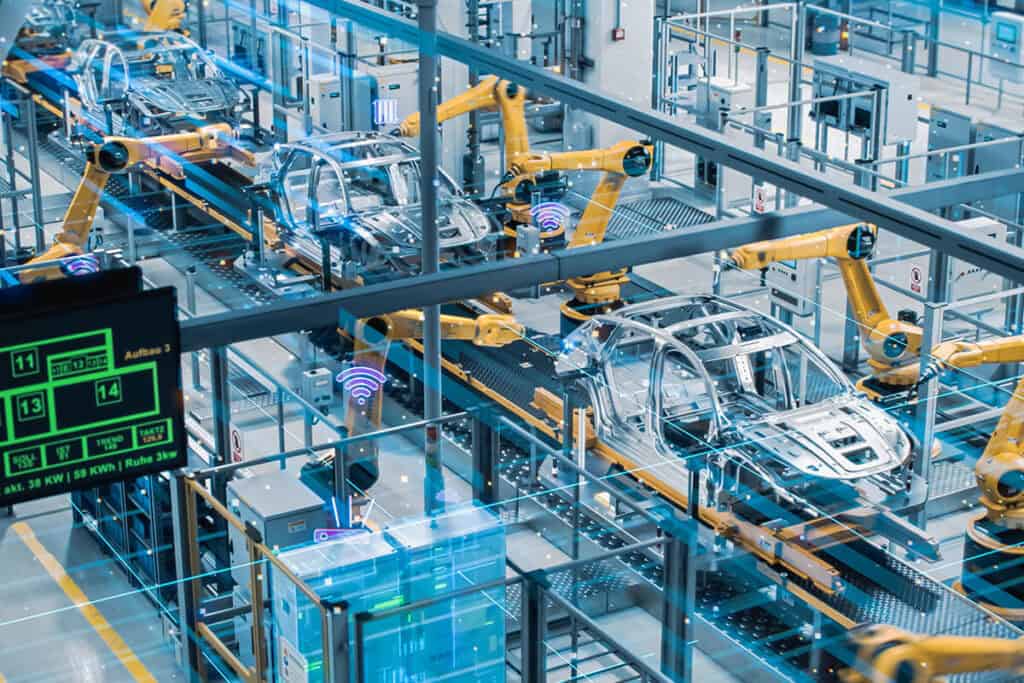
AI-powered ERP systems are also transforming the manufacturing sector. In one case study, a company demonstrated predictive maintenance, analyzing sensor data and historical records to predict maintenance needs. AI-enhanced ERP systems are also optimizing production schedules, suggesting adjustments to minimize costs and waste. AI for ERP can improve operational efficiency, resource allocation, and cost management for decision-makers at all levels of almost any manufacturer.
Retail Industry Innovations

For retailers, AI-enhanced ERP systems are boosting business performance by enabling new levels of personalization and better customer relationship management (CRM). AI features also analyze retailers’ ERP and customer data to automate support and provide real-time recommendations and insights. AI for ERP in retail drives customer loyalty and business success.
How to Choose the Right AI-Enabled ERP Solution?
Choosing the right AI-enabled ERP solution is crucial to maximize the benefits of AI-ERP integration for your company. When selecting an AI-enabled ERP solution, you should look for the key features mentioned here, and focus on integration with your other operational systems. The right mix of features will enable your organization to take maximum advantage of the AI technologies included in your ERP system.
Key Features to Look For
Advanced Analytics: AI-enabled ERP systems should have robust analytics capabilities, allowing organizations to analyze and derive insights from vast amounts of data.
Automation: Look for AI tools and features that automate routine tasks, such as data entry, invoice processing, inventory management, and initial incident processing and escalation. Effective automation can free up human resources for more strategic initiatives and valuable tasks.
Natural Language Processing: NLP can enable smoother, more intuitive user interactions through voice commands, chatbots, and intelligent search capabilities.
Machine Learning Algorithms: ML algorithms help to identify patterns and trends in historical and current data. These can enable predictive analytics and improve decision-making and forecasting across your entire organization.
Engaging Interfaces: User-friendly interfaces for enterprise applications such as ERP are crucial for rapid user onboarding and adoption. This is especially true as you add new AI-powered features to your ERP solution. Look for user interfaces that are appealing, intuitive, and easily tailored to meet specific needs.
Table: Key Features of AI-Enabled ERP Solutions
|
Feature |
Description |
|
Advanced Analytics |
Robust analytics capabilities for data analysis and insights |
|
Automation |
Automation of routine tasks to improve efficiency and reduce manual effort |
|
Natural Language Processing |
Natural language processing for intuitive user interaction |
|
Machine Learning Algorithms |
Machine learning algorithms for predictive analytics and optimization |
|
User Interface |
User-friendly interface for enhanced user experience |
Vendor Evaluation and Selection Criteria

Beyond system features, you must also carefully evaluate candidate ERP solution vendors. You must be sure your chosen ERP vendor can meet your organization’s specific needs and deliver the AI-powered features and integrations you need to succeed.
When evaluating and selecting an ERP vendor for AI-enabled ERP solutions, organizations should consider several key criteria to ensure a successful implementation.
Industry Expertise: Choose a vendor with industry expertise and experience in implementing AI-enabled ERP solutions in your specific sector, preferably for companies similar to yours.
Scalability: Ensure that the vendor can scale your ERP solution as needed to support your organization’s future growth and expansion.
User Interface: Evaluate the user interface and ensure that it is intuitive, user-friendly, easily tailored as needed, and aligned with your organization’s user experience (UX) requirements.
Implementation Support: Consider the level of support provided by the vendor during the implementation process. Focus on training, documentation, and ongoing technical support. Also collect information about your candidate vendors’ timeliness of responses to incidents, problems, and questions.
Competitive Edge: Assess how each candidate ERP vendor’s AI-enabled solution provides a competitive edge for your organization, such as improved efficiency, cost savings, or enhanced customer experiences.
Conclusion
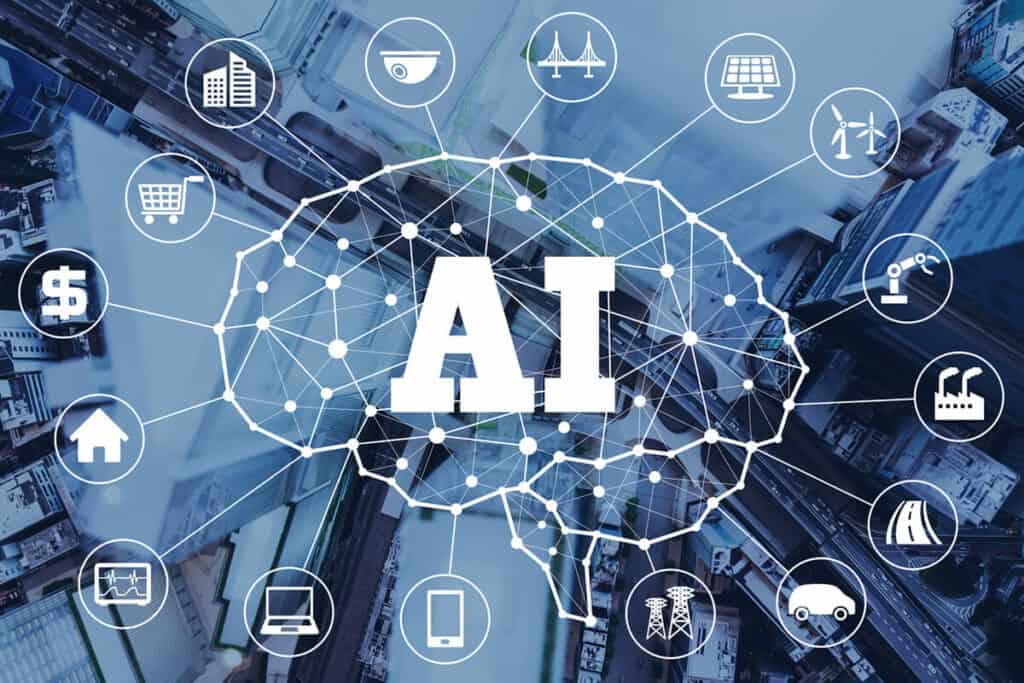
Integrating AI with ERP systems leverages core AI technologies to optimize business processes. AI-enabled ERP solutions can enhance your company’s customer experiences, financial operations, and overall efficiency and competitive agility.
AI innovations such as NLP and ML algorithms are transforming ERP data analytics, enabling more accurate and actionable forecasts and decision-making. Such features can deliver benefits to your organization in customer interaction, supply chain management, and other areas.
Careful evaluation of candidate AI-enabled ERP solutions and their vendors will ensure you choose the right partner and tools for your specific business needs and goals. This will set the stage for you and your organization to achieve more efficient business operations, accelerate your digital transformation, and unlock unparalleled business benefits and competitive advantage.



